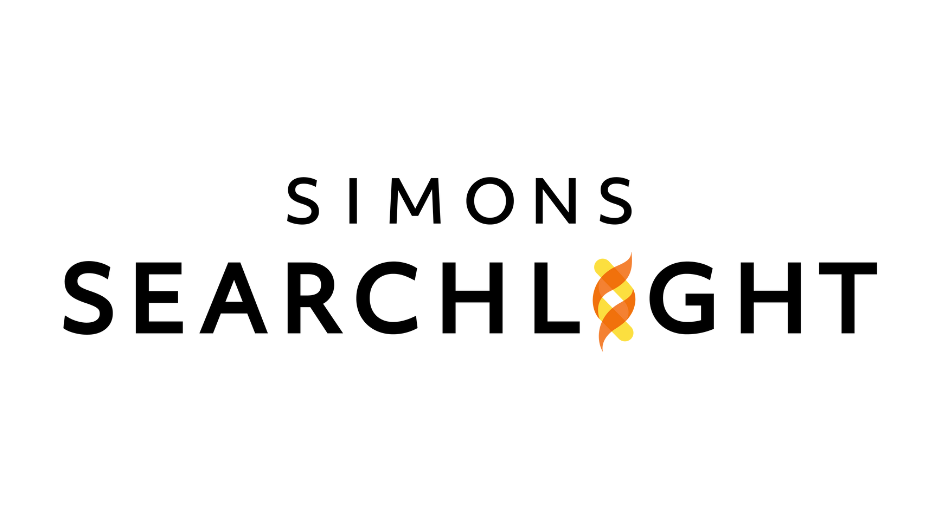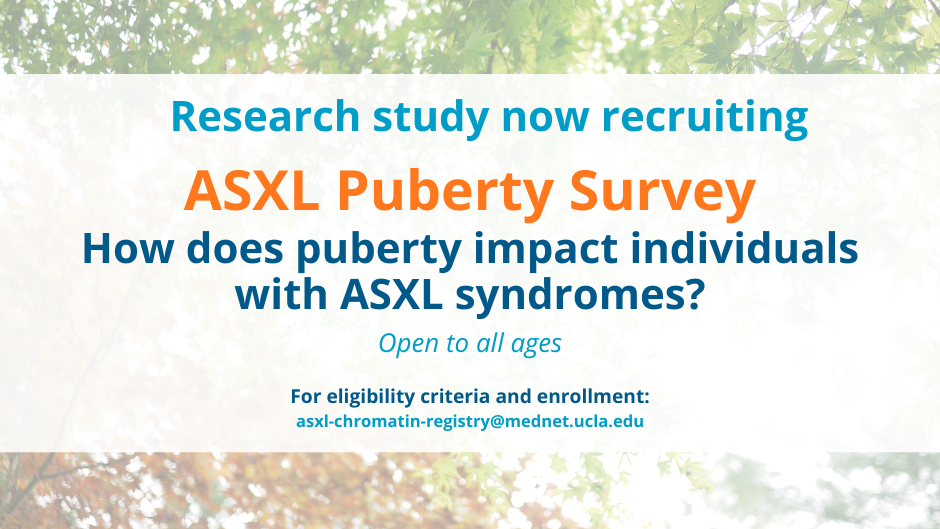Enroll in a research study
There are many unanswered questions about life with Bohring-Opitz Syndrome (ASXL1), Shashi-Pena Syndrome (ASXL2), and Bainbridge- Ropers Syndrome (ASXL3). We are still working to find treatments that can improve the quality of life for affected individuals and their families. Participation in research studies is vital to providing crucial answers and driving innovation in treatment. Researchers can’t do it alone—they need your help in understanding these rare diseases.
Participating in ASXL research can look like:
Enrolling your child in a registry or natural history study, which are standardized collections of data to document your child’s symptoms and development. Participation typically includes taking surveys or assessments annually or at another regular frequency. Registries and natural history studies can help us better understand the features of the disorder and help us answer the question, “What does this disorder look like over time?” Strong natural history studies are also crucial components of clinical trials in rare disorders.
Contributing a biological sample, such as a blood sample, to a biorepository. Biological samples are critical tools for researchers to better understand ASXL biology as we look for possible treatments. They can be used to develop cellular models in which researchers can test treatments or biomarkers that can measure the effectiveness of a treatment. You can give a sample at the ASXL Family Conference or arrange a sample to be collected during a routine blood draw or hospital procedure.
Taking surveys or participating in interviews that seek to answer specific questions about family experiences and patient symptoms.
If you still have questions about participating in research, we invite you to read our guide for participating in research studies (PDF) to learn more.
Join a research study
You or your child may be eligible to enroll in one or more of the research studies listed below. Most studies will require a copy of your loved one’s genetic report, so we encourage you to find that document and keep it where you can find it easily.
How to find your genetic report
Your loved one’s genetic test report has important details about their diagnosis, including the exact spot in the gene where a variant was found. Researchers need this information to help with their studies. This report was likely ordered by a doctor and provided by a laboratory (such as GeneDx, Ambry Genetics, or Prevention Genetics). Look for a document with your loved one’s name, the gene with the variant (mutation), the variant’s location (a series of letters and numbers), and what the variant means (like pathogenic or uncertain). See an example of a genetic test report to help you find the right document.
If you have any questions about joining a research study, please reach out to our Sarah Scott, Family Education and Engagement Coordinator, at sarah@arrefoundation.org or by phone/text at 207-881-8080 and she can help you.
ASXL-Related Disorders Natural History Study and ASXL Biobank
Continually enrolling
The ASXL-Related Disorders Natural History Study (formerly called the ASXL Registry), is led by Dr. Bianca Russell at UCLA. This is the main clinical study seeking to better understand ASXL-related disorders. This study counts the number of patients with Bohring-Opitz Syndrome (ASXL1), Shashi-Pena Syndrome (ASXL2), and Bainbridge-Ropers Syndrome (ASXL3) and gathers information about symptoms and complications over time. Study enrollment includes completing an initial questionnaire with opportunities to complete future questionnaires. Participants may also optionally enroll in the biobank, which collects biological samples (typically blood) to be used in research studies. This study is funded in part by the ARRE Foundation.
Research Questions in ASXL-Related Disorders Survey
Deadline extended: Monday, March 31, 2025
There are many unanswered questions in ASXL-related disorders. This study aims to collect feedback from the ASXL community on which research questions are the most important to answer. The results of this study may inform the future direction of ASXL research. Parent/caregiver participants can also share information in this research survey about their child’s symptoms and abilities to help researchers better understand the full clinical spectrum of ASXL-related disorders.
CHAMPION Study (Chromatinopathies and Autism: Motor Phenotyping and Indicators of Neurodevelopment)
Currently enrolling
This study is being led by Dr. Rujuta Wilson, MD, a researcher and behavioral child neurologist at UCLA who studies motor development in children. We are enrolling children 1 to 5 years old with ASXL-related disorders or other Chromatin Modifying Disorders (also known as chromatinopathies). This research hopes to develop better tools/methods to help us identify, monitor, and evaluate delays as well as come up with better treatment and therapeutic options. This study is being conducted in-person at UCLA, at the 2024 ASXL Family Conference and virtually.
Virtual well-being groups for parents of children with autism
Currently enrolling
Researchers at Rowan University are conducting a study examining how parents of children with autism prefer to participate in virtual parental well-being groups. Parents will be randomized into either a 6-hr workshop group, a 3-week group with 2-hr sessions once per week, or a 6-week group with 1-hr sessions once per week. The groups will target parental well-being, be entirely virtual, and will be scheduled based on participant availability. After the completion of the virtual group session(s), parents will receive two sessions of virtual parent training to learn skills to address their child’s challenging behavior.
Note from the ARRE Foundation: Your child does not need a formal autism diagnosis to be eligible, but your child must be identified as having autism or autistic traits in some form.
Natural history study for ASXL3-related neurodevelopmental disorder (Bainbridge-Ropers Syndrome)
Currently enrolling
Dr. Meena Balasubramanian and Dr. Emily Woods at the University of Sheffield are launching a longitudinal (long term) research project to study ASXL3-related disorder (Bainbridge-Ropers Syndrome) over time. This study includes attending a clinic visit (virtual or in person) and completing a questionnaire each year to track your loved one’s progress over time. There is additional optional opportunity to provide a blood or skin biopsy sample.
Simons Searchlight ASXL3 registry
Currently enrolling
Simons Searchlight is collecting data on individuals and families living with ASXL3-related disorder (Bainbridge-Ropers Syndrome). Study enrollment includes completing an initial questionnaire with opportunities to complete future questionnaires.
ASXL Kidney and Bladder Health Survey
Enrollment complete
Help us learn more about kidney and bladder health in ASXL-related disorders! Anyone with an ASXL-related disorder (Bohring-Opitz, Shashi-Pena, or Bainbridge-Ropers Syndrome) of any age is eligible to participate in the ASXL Kidney and Bladder Health Survey. Study participation includes a 10-20 minute electronic survey to be completed by a parent/caregiver with the option to share medical records that may help researchers understand your child’s experience with kidney-related health concerns.
Bohring-Opitz Syndrome EEG study
Enrollment complete
Help us learn if individuals with Bohring-Opitz Syndrome have a distinct brainwave pattern! The purpose of this study is to establish if a pattern of distinct brainwaves can be used as a biomarker for Bohring-Opitz Syndrome in future clinical trials. Biomarkers are critical tools in the journey to finding treatments, because they allow us to measure an individual’s status before and after an intervention (like a drug) to see if there is a change.
Inchstone Project survey
Enrollment complete
This research project is sponsored by the Inchstone Project, a collaborative effort of patient advocacy groups representing severely affected individuals and clinicians who are experts in outcome measurement. This project is dedicated to filling the enormous gap in the ability of existing assessment measures to capture and reliably measure the small but meaningful “inchstones” our severely affected children achieve. Most existing assessment measures just say our children can’t do anything. We know that is not true and we need measures that can capture what they can do and what they continue to learn to do.
Bainbridge-Ropers Syndrome - A Natural History Study Cohort Study
Enrollment complete
This study will investigate the severity of symptoms experienced by people with Bainbridge-Ropers syndrome and the effects these symptoms have on both the patient and their carers. This study aims to help inform clinical management of people with Bainbridge-Ropers syndrome (BRS).
Shashi-Pena Syndrome (ASXL2) data collection
Enrollment complete
A team at Duke University and Cincinnati Children’s Hospital is collecting data about individuals with Shashi-Pena Syndrome. Please contact Rebecca Spillman at rebecca.crimian@duke.edu to inquire about participating.
ASXL Puberty Survey
Enrollment complete
Help us learn more about how puberty impacts individuals with ASXL syndromes! Anyone with an ASXL syndrome of any age is eligible to participate in the ASXL Puberty Survey conducted by a research team at UCLA. Study participation includes a 10-20 minute electronic survey to be completed by a parent/caregiver with the option to share medical records that may help researchers understand your child’s growth and development (such as bone scans, medical imaging, and growth charts).
Basic and translational research
Valerie Arboleda, MD, PhD
University of California Los Angeles, United States
@arboledaval
ARRE Foundation-funded grant project: Molecular and clinical biomarker development for Bohring-Opitz Syndrome
Rosanna Weksberg, MD, PhD
The Hospital for Sick Children, Canada
ARRE Foundation-funded grant project: Development and diagnostic applications of ASXL1 and ASXL3 DNA methylation signatures
Micha Drukker, PhD
Leiden University, Netherlands
@drukkermicha
ARRE Foundation-funded grant project: Establishment of stem cell models and enteric nervous system screening platforms for ASXL disorders
Feng-Chun Yang, PhD
UT Health San Antonio, United States
ARRE Foundation-funded grant project: Identifying molecular targets for ASXL1 alteration-associated BOS
Dale Frank, PhD
Technion – Israel Institute of Technology, Israel
ARRE Foundation-funded grant project: Utilizing early Xenopus laevis (frog) neural development as a platform for understanding Bainbridge-Ropers Syndrome
















